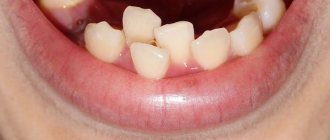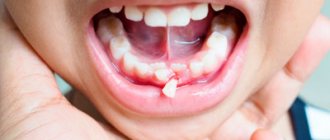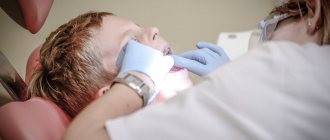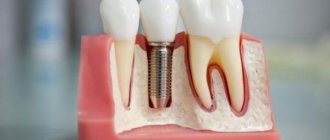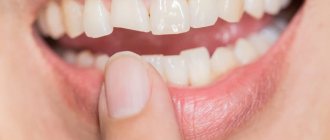If you take care of your teeth, they will always have an attractive appearance. If the teeth are healthy, then they allow their owner to bite and chew food without pain. Only teeth that a person takes care of will always allow him to be in comfort. Therefore, people consistently brush their teeth and visit dentists. However, no matter how high-quality dental care is carried out, at one moment a person may feel severe pain if he eats a cold or hot dish. If this happens, then there is a possibility that the teeth suffer from hyperesthesia - high sensitivity to external factors. The reason may be the destruction of the enamel. If pain occurs from sudden temperature changes, then this indicates 1 degree of hyperesthesia. You need to visit a dental clinic as soon as possible before the problem gets worse. The dentist will quickly find the causes of the problem, and then eliminate these causes.
What is hyperesthesia?
Hyperesthesia is an extreme sensitivity to external stimuli, such as sudden temperature changes, chemical exposure or ordinary touch. Such irritating factors can lead to short-term but severe pain. At the first stage, the teeth react to the temperature of the food, but later pain also arises from simply touching the tongue or exposure to certain substances. There is short-term pain that goes away quickly. Sometimes it doesn’t go away until 10-30 seconds.
If the tooth structure is so damaged that the nerve endings are exposed, then the person will experience pain from simply touching the area with a tongue or finger. Tooth enamel is the most durable tissue in the human body. It allows you to protect dentin from any external irritants. If the enamel is damaged, then any external factors will cause severe discomfort. If the dentin seal is broken, even the lightest touch will cause severe pain.
Special studies have been conducted that have shown that every third person suffers from hyperesthesia in the modern world, regardless of their location, social status or lifestyle. However, statistics have shown that women are more likely to suffer from this disease than the male population.
Causes of tooth sensitivity
Tooth sensitivity is usually caused by thinning enamel and gum wear. The pain does not occur immediately, but gradually, often unnoticeably. You need to visit a doctor as soon as discomfort appears, because it means that the disease has been progressing for a long time. Teeth sensitivity occurs solely as a consequence of another problem, causes:
- Demineralization of enamel (visible by white spots);
- Caries;
- Periodontitis, in which the root is exposed;
- Cervical defects;
- Bite pathologies.
- The habit of creaking, clenching the jaw.
Typically, hyperesthesia is precisely the sensitivity of tooth enamel, its thinning, which occurs due to:
- Excessive consumption of acid-containing foods (they wash away calcium);
- Eating very hard foods;
- Using hard toothbrushes;
- Abuse of bleaching agents;
- Recent removal of tartar;
- Smoking;
- Pregnancy;
- Hormonal imbalances.
Some people have a hereditary predisposition to hyperesthesia.
If teeth react to hot
Domestic dentists say that at least half of Russians face this problem. Discomfort begins to haunt the patient in the morning, after a cup of hot coffee. If a tooth reacts to heat, it can be difficult to find out the cause. It is not always noticeable upon superficial examination. Usually the fault lies with:
- Deep caries. Superficial lesions do not give such a reaction. More often we are talking about cavities under the gums, which are visible only on x-rays.
- Fresh filling. Such pain is considered normal if it goes away after a few days. The same is true for other dental procedures.
- Increased washability. Due to pathological abrasion, by the age of 40 a person can lose up to 50% of tissue.
- Cervical defect. More common in older people.
- Erosion of enamel. It is caused by external factors (sweets, bleaching agents, etc.) or gastrointestinal diseases.
These are the main reasons why a tooth hurts from hot food. Only 10% of the time the pain is due to something else.
If teeth react to cold
When a tooth reacts to cold, the patient may experience either mild discomfort or severe pain. The reasons are similar to those listed above. Most often, the pathology is caused by caries, chips, and scratches of the enamel. If a tooth reacts to cold after filling, but the discomfort goes away within a week, this is normal.
The most severe pain is caused by pulpitis, as it exposes the nerves. Gum diseases also lead to unpleasant consequences. The subgingival part - dentin - is not protected by enamel, therefore it reacts to temperature, food and even street air.
How to protect teeth from hyperesthesia?
Many people believe that it is enough to brush their teeth twice or thrice a day, and they will always be fine. However, this is a common misconception! If you brush your teeth incorrectly, they will not only not become stronger, but, on the contrary, they can be seriously harmed. For example, a high abrasive content in toothpaste will cause the enamel to become thinner.
The best solution would be to buy a fluoride-containing paste that has a medium level of abrasiveness. During the research, it was possible to identify why this disease occurs less often in men. The fact is that due to stress, the functioning of the gastrointestinal tract is seriously deteriorated. Because of this, the acidity of the oral cavity changes. Due to frequent exposure to acid, they become highly sensitive to irritants, which results in severe pain that causes a lot of discomfort.
To avoid hyperesthesia, you need to brush your teeth every day and try as much as possible to protect yourself from stress.
Toothache caused by hot and cold foods
If your teeth respond with a painful reaction when eating such dishes, this means that the problem lies in the enamel of the teeth. When the enamel is healthy, the tooth structure is reliably protected from sudden temperature changes. If your teeth respond with pain when you eat, you should immediately visit a dentist to identify the cause. Here are a few reasons that cause such pain:
- Tissue inflammation has occurred;
- The structure in the enamel is damaged;
- Non-carious lesions;
- Cracks have appeared;
- Due to severe stress, the enamel has become thinner.
By the way, it happens that such pains are caused by the endocrine system or they may be caused by a stomach disease. It is necessary to reconsider your eating habits. It is necessary to reduce the consumption of foods with too high and low temperatures, and also be careful when drinking sour juices. To do this, you should use a straw.
Ways to relieve toothache
If visiting a doctor is impossible for some reason, then there are ways to relieve pain at home. For some time, the listed methods provide relief, allow you to forget about the problem and calmly go about your business, but do not exclude the cause of the recurrence of toothache. Therefore, visit the dentist as soon as possible.
So, if your tooth hurts, take a painkiller, widely known and sold at the pharmacy. If there is no pharmacy, use iodine - moisten a cotton swab with two or three drops and place it on the painful area. The effect of this method is short-lived - toothache will be relieved for a maximum of five hours.
Another way is to use tinctures and decoctions. For toothache, a decoction of sage is effective (one tablespoon per 200 mg of boiling water, leave for 20 minutes, tightly closing the mug on top). Rinse your mouth with the resulting mixture. An infusion of chamomile is also effective - pour boiling water over one teaspoon of chamomile and leave for ten minutes, then rinse your mouth with the decoction. It is necessary to rinse at least five times a day. To rinse your mouth for toothache, you can use soda - add a teaspoon of salt or soda to one glass of water.
If a tooth hurts, place a piece of cotton wool soaked in alcohol in your ear on the side of the painful tooth, this will help relieve the pain.
If you have a toothache, you should absolutely not heat the sore spot. Heating it can only lead to the development of pain and an increase in the inflammatory process.
Remember that toothache is a symptom that some kind of inflammatory process has already begun in the oral cavity. Do not hesitate and do not get carried away with home treatment, but immediately make an appointment with the dentist.
To ensure that the question of what to do for toothache arises as rarely as possible, visit the doctor yourself twice a year. Our Dentistry on Shchelkovskaya has a system of appointment reminders, so you definitely won’t miss a preventive examination. Make an appointment now by calling 8 or using the online appointment form. We are located near metro station Shchelkovskaya.
Hyperesthesia after visiting the dentist
You should only visit reliable dental clinics. If the doctor does not have the proper skills and professionalism, then hyperesthesia may occur due to his actions. Most often the disease appears due to the following procedures:
- Cleaning and whitening of the dental cavity;
- Filling with photopolymerization procedure;
- Acid etching.
After any bleaching, special enamel protection must be carried out. If, after teeth whitening, pain is felt when eating foods with high and low temperatures, this means that the procedure was not carried out or was not performed as it should.
After the operation, the filled tooth became very sensitive to food with high and low temperatures, this may mean:
- Some inflamed tissue was never eliminated;
- Tissue inflammation has occurred;
- The doctor did not follow the technology, so the integrity of the seal was damaged during the installation process;
- The filling material irritates the tissue due to individual intolerance;
- There is an air bubble under the filling.
Unfortunately, in almost all of the above cases, the pain will not go away, but will get worse. When the pulp overheats, pulpitis can develop, which will lead to damage to other tissues. If your teeth react strongly to temperature changes for a long time, then you need to solve this problem as soon as possible.
As for tooth depulpation, it is normal if after the procedure the tooth reacts sharply to cold and hot food. If after some time the pain still remains, then you need to go to the dental clinic, because there is a possibility that the tooth was not fully treated.
Why do teeth react to hot and cold?
Pain in the teeth is always an unpleasant sensation. But often people are in no hurry to visit the dentist, hoping that “this will pass.” People usually do not react to increased tooth sensitivity at all, considering it a “non-serious” disease. The reaction of teeth to hot and cold is also not considered a serious problem. Although with this disease, eating ice cream or drinking hot tea or coffee becomes a problem.
The reaction to the temperature of the product is called hyperesthesia. It comes in two types:
- localized. In this case, the disease affects 2-3 teeth;
- generalized. Almost all teeth are affected.
But why does it appear? And is it necessary to do something about it?
Reasons for reaction to temperature
Many people think that damaged enamel causes a similar reaction. But this is not the only reason. There are differences between the reaction to cold and hot.
Why do teeth react to cold?
- Damaged enamel. Because of it, discomfort is felt after eating cold food (ice cream), water, or when inhaling cold air. This happens because the tooth’s protection is weakened. The pain does not cause severe discomfort. There are many reasons for damage to enamel: from impact to bleaching - both external factors and eating the wrong, unhealthy food - internal factors;
- Exposed neck of the tooth. In this case, the gums peel off and pain is felt upon contact with cold food;
- Peptic ulcer or stomach disease;
- Hormonal imbalances due to pregnancy;
- Increased sensitivity;
- Neglect of oral hygiene rules.
In any case, when a tooth hurts from cold, you should not self-medicate. A serious illness may be hidden behind the usual discomfort when eating cold foods.
Why does a tooth react to heat?
- The nerve is exposed. This may cause your breath to smell bad. The reaction to hot is strong. The pain is difficult to bear;
- Improper calcium metabolism in the body;
- During pregnancy;
- Caries. With it, the pain usually lasts a few seconds, then goes away;
- Purulent inflammation in the oral cavity.
If you start the disease, ignore that the tooth hurts from hot and cold, the simple inhalation of air will begin to cause discomfort.
What to do?
In any case, whatever the reason, you need to visit a dentist. Self-medication in this case is strictly prohibited. There is a huge amount of advice among the people, but if the problem is not just hypersensitivity, but there is a serious illness, folk remedies will only worsen the situation. The maximum that can be done with folk remedies is to harm yourself even more. And the development of the disease will continue.
What do dentists do in such situations?
If the problem is an exposed nerve, it will be removed and the tooth will be filled. After this procedure, the tooth will not stop responding to temperature when cut. This condition will last 2-3 days, and you will have to take painkillers.
If suddenly the pain still torments you after three days, you need to go to the doctor again.
If the cause is damaged enamel or increased sensitivity, dentists use other methods.
- Modern medicine widely uses lasers. They act on microparticles of water contained in the hard tissues of teeth. The dentist compacts the enamel in this way, and the teeth become less sensitive. The procedure takes very little time: one tooth is treated from one to three minutes.
- Electrophoresis is one of the most effective methods. The doctor acts on the oral cavity with currents of a special frequency that treat teeth.
- Pulp removal. Used in difficult or advanced cases. To do this, the doctor will first remove the enamel, which is destroyed, and dentin (the hard tissue that is the main part of the tooth). Next comes the preparation of carious tissues, cutting off part of the dental cavity. In the process, the dentist cleans out the root canals, which contain bundles of nerves and blood vessels. When depulpation is completed, the patient has the diseased tooth filled.
But you should visit a trusted specialist, after which you will not have to re-treat your teeth. Inexperienced dentists may not completely remove the nerve or fill it incorrectly. Which will cause even more discomfort.
Contact trusted specialists
Contact our family dentistry “VTV” in Moscow. The clinic offers a wide range of dental services. The prices are quite affordable. There is a system of discounts for regular customers. To save visitors' finances, the medical center holds various promotions.
The center's specialists will examine the oral cavity and point out areas that require special attention. Doctors have good work experience and are highly qualified.
After treating the disease, the doctor will give recommendations on how to prevent such cases. He will recommend professional toothpaste and tell you how to properly care for your teeth.
The VTV Medical Center has both cash and non-cash payment systems.
To view the price list, you can visit the website of the medical center. In addition to information about the clinic, you can read useful information about how to care for your oral cavity.
The medical center staff does everything possible to make clients happy.
How to avoid hyperesthesia
To avoid hyperesthesia, you need to regularly take care of your tooth enamel. Here are a few simple rules that will help keep your enamel healthy:
- Brush your teeth every day with fluoride toothpaste. But you should avoid pastes that contain abrasives;
- To brush your teeth, you should choose a brush with medium hardness. You need to brush your teeth thoroughly, but without being too harsh;
- Be sure to eat foods that contain calcium and phosphorus. But you need to eat less sweets;
- Avoid eating very hot or cold foods. If you drink a hot drink, you should avoid getting it on your teeth.
If you have toothaches, you need to visit a qualified dentist so that he can find out the causes and then eliminate them. If everything is fine with your teeth, you should still go to the dental clinic once every six months for preventative care. If your teeth are in order, then going to the dental clinic will be a simple, pleasant walk.
How to solve a problem
Treatment begins when the origins of the disease are found. Each of the diseases, due to which the tooth reacts to cold and hot, is solved in its own way:
- The carious cavity is filled;
- Wedge-shaped defects are restored with composite material;
- Periodontitis is treated by removing deposits and treating exposed areas with a remineralizing composition.
Sometimes non-local pathologies occur. The patient does not know what to do, tooth sensitivity interferes with normal life, and the dentist does not offer a solution. In this case, fluoridation and remineralization are suitable. They will saturate the enamel with calcium and fluoride. Prevention
When a tooth hurts from cold and hot, every meal turns into a small test. To protect yourself from this trouble, it is advisable to adhere to the following rules:
- Maintain hygiene. You need to do proper cleaning at least twice a day. Choose a soft or medium-hard brush. You can't put pressure. Gums are especially carefully cleansed. For hard to reach places use floss. Fluoride rinses are helpful.
- Watch your diet. Sour and hard foods are harmful.
- Visit the dentist in a timely manner. Inspections are carried out every six months.
You also need to give up the habit of grinding and clenching your jaw. If this happens unconsciously even in a dream, you need to wear a mouth guard.
Thus, the only answer to the question of how to reduce tooth sensitivity is to find the cause of the pathology and eliminate it.
Sometimes this phenomenon goes away on its own, if we are talking about recent dental surgery, pregnancy, etc. In other cases, you need to consult a dentist and adhere to preventive measures. Fluoride-containing products are of great benefit. Some people recommend rubbing a thin layer of fluoride paste on to reduce sensitivity. But first, dentistry (Kazan) and consultation with a specialist, and only then should you resort to home treatment methods. The doctor's consultation





